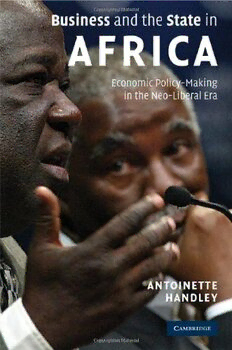
Business and the State in Africa: Economic Policy-Making in the Neo-Liberal Era PDF
306 Pages·2008·1.161 MB·English
Most books are stored in the elastic cloud where traffic is expensive. For this reason, we have a limit on daily download.
Preview Business and the State in Africa: Economic Policy-Making in the Neo-Liberal Era
Description:
The dominant developmental approach in Africa over the last twenty years has been to advocate the role of markets and the private sector in restoring economic growth. Recent thinking has also stressed the need for 'ownership' of economic reform by the populations of developing countries, particularly the business community. This book studies the business-government interactions of four African countries: Ghana, Zambia, South Africa and Mauritius. Employing a historical institutionalist approach, Antoinette Handley considers why and how business in South Africa and Mauritius has developed the capacity to constructively contest the making of economic policy while, conversely, business in Zambia and Ghana has struggled to develop any autonomous political capacity. Paying close attention to the mutually constitutive interactions between business and the state, Handley considers the role of timing and how ethnicised and racialised identities can affect these interactions in profound and consequential ways.
See more
The list of books you might like
Most books are stored in the elastic cloud where traffic is expensive. For this reason, we have a limit on daily download.
